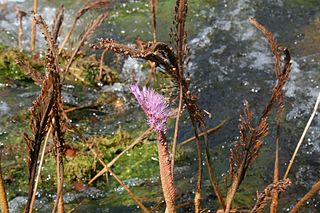
The country of Brazil occupies roughly half of South America, bordering the Atlantic Ocean. Brazil covers a total area of 8,514,215 km2 (3,287,357 sq mi) which includes 8,456,510 km2 (3,265,080 sq mi) of land and 55,455 km2 (21,411 sq mi) of water. The highest point in Brazil is Pico da Neblina at 2,994 m (9,823 ft). Brazil is bordered by the countries of Argentina, Bolivia, Colombia, Guyana, Paraguay, Peru, Suriname, Uruguay, Venezuela, and France.

Chusquea is a genus of evergreen bamboos in the grass family. Most of them are native to mountain habitats in Latin America, from Mexico to southern Chile and Argentina.

Psidium is a genus of trees and shrubs in the family Myrtaceae. It is native to warmer parts of the Western Hemisphere. Many of the species bear edible fruits, and for this reason several are cultivated commercially. The most popularly cultivated species is the common guava, Psidium guajava.

Podostemaceae, a family in the order Malpighiales, comprise about 50 genera and c. 300 species of more or less thalloid aquatic herbs.

The South American Division (SAD) of Seventh-day Adventists is a sub-entity of the General Conference of Seventh-day Adventists, which oversees the Church's work in most of South America, which includes the nations of Argentina, Bolivia, Brazil, Chile, Ecuador, Peru, Paraguay, and Uruguay. Its headquarters is in Brasilia, Brazil. The Division membership as of June 30, 2021 is 2,545,366

Luziola (watergrass) is a genus of New World in the grass family, native to North and South America including the West Indies.
The Caroaebe River is a river of Roraima state in northern Brazil, near the equator.
Gymnopogon (skeletongrass) is a genus of American and Southeast Asian plants in the grass family.
Pieter van Royen (1923-2002) was a Dutch botanist. He is an author of many papers on the flora of New Guinea.
Apinagia is a genus of flowering plants belonging to the family Podostemaceae.
Castelnavia is a genus of flowering plants belonging to the family Podostemaceae.
Ceratolacis is a genus of flowering plants belonging to the family Podostemaceae.
Cipoia is a genus of flowering plants belonging to the family Podostemaceae.
Marathrum is a genus of flowering plants belonging to the family Podostemaceae.

Rhyncholacis is a genus of flowering plants belonging to the family Podostemaceae.
Lophogyne is a genus of flowering plants belonging to the family Podostemaceae.

Mourera is a genus of flowering plants belonging to the family Podostemaceae.
Oserya is a genus of flowering plants belonging to the family Podostemaceae. Its native range is northern South America, and it is found in Bolivia, Brazil, French Guiana, Guyana, Suriname and Venezuela.
Noveloa is a genus of aquatic flowering plants in the family Podostemaceae. Species of the genus are distributed across north and west Mexico in seasonally dry tropical areas, and plants are found in shallow, clear, fast-flowing rivers.
Noveloa longifolia is a species of flowering plant in the riverweed family Podostemaceae. It is native to river rapids in the Mexican states of Jalisco and Colima.








